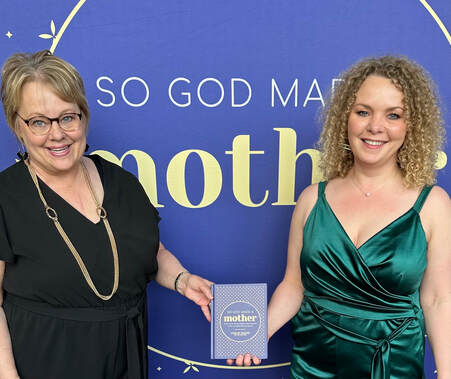|
My mom’s car was impounded in Omaha this past weekend, and honestly, it was the best thing that’s happened to me in a long time.
We were celebrating the launch of the book So God Made a Mother. I was fortunate to be chosen as a contributor. I’d written about motherhood—adoption, specifically—and I thought, who better to bring as my plus-one for this event than my own mom? It was a harder choice than you might imagine, though. My mom and I had drifted apart over the past decade, and motherhood was the wedge that had come between us. She had become a mother with such ridiculous and fortunate ease. My own experience was not so lucky. Infertility was full of unexpected pressures and emotions. I was resentful that my own mother had what I so desperately wanted (four times over), and that I was to her exactly what I wanted for myself but could not have. It was a confusing paradox, one that had left me bitter and angry as I struggled to bear the impossible weight of my grief, a paradox in its own right, for how can you grieve what you’ve never even had? Impossible or not, my grief was very, very real. It was quiet, private, and dark—suppressed, even—while hers was…well, it wasn’t any of those things. Her grief felt too loud, too public, too exposed. And I didn’t feel like she had the right to grieve my tragedy in that way. I was angry, but not just with her. She hadn’t caused our infertility, and rationally, I knew that. I was angry with forces beyond my control, with circumstance, with the very Creator of the universe. But I needed someone to blame. My rage was a powder keg—I was loaded for bear with nowhere to shoot. Mom was the only place I could expel my rage, so I aimed my guns at her. And she shot back. Fighting with my mom was like fighting with myself. We’re alike in so many ways, so I knew where to aim to inflict the most damage. I weaponized that knowledge, and I think she did the same. I became a mother in the midst of that war zone. Becoming a mother was hard. It was years of white-knuckled foster care, when I was clinging to children that I desperately wanted to call my own, but who only might become mine if the biological parents’ rights were terminated. I learned to love without the guarantee of reciprocity. I learned to make the most of the time I have with the kids in my care, to love them while I have them, because there are no guarantees in foster care. Foster care is the hardest thing I have ever done. Eventually, though, I realized that my mom was the reason I was strong enough to do it, and I put down my guns and called a truce. Thankfully, my mom was open to it. So this trip to Omaha wasn’t just a celebration of success and motherhood. It was a reunion of sorts. Mom and I embarked on the five-hour drive with mild trepidation—we hadn’t spent any time alone together without fighting in years. But conversation flowed easily enough, and the drive passed rather quickly. The launch party was lovely, and Mom was my own personal paparazzi, capturing the night with photographs of me exchanging names and signatures and contact information with the other writers. It was such a joyous occasion, and I felt celebrated, not only by the awesome So God Made a Mother team, but by my mom. I was walking on air that night, despite the rain and the cold. And then, when we woke up the next morning, Mom’s Jeep was gone. It had been impounded. Mom was distraught. I was furious. We had to be back in Minnesota for a family funeral on Monday. Tearful pleas from Mom and angry tirades from me did nothing to move the man who had mom’s Jeep. He claimed he could do nothing until Monday, and he would be charging us per day until then. We were exasperated. We had no choice but to get out that juicer and some sugar and make some lemonade. At this point, our misfortune went from tragic to hilarious. We walked from our hotel room to grab some food, and it began to pour rain. Mom was drenched, because she had left her coat inside her car. We rented a car from a private party that reeked of weed and lacked power locks and windows. The owner apologized for the smell—the previous renter had returned it with three air fresheners hanging from the mirror that had done nothing to mask the skunky-sweet stench—and gave us the option to cancel. The smell was…noticeable. But we were desperate, the car was cheap and readily available, and things were getting way more expensive than we’d initially planned, so we took it anyway. Because of this inconvenience, I spent an extra 48 hours with my mom. I don’t think I realized how badly I needed that extra time until we were caught up in it. We laughed so much—about the way the shady impound lot guy refused to give us the actual address of the lot, saying instead, “Look for the orange truck.” (Turns out there are more than a few orange trucks in Omaha. It took us a couple tries to find the place.) We laughed when the shady impound lot guy refused to give her the Jeep back because she had just purchased it and didn’t have the registration in the glove box—it was still sitting at home on the counter. We laughed as we waited for my dad to drive 40 miles home from work to take a photograph of the car title, and we giggled like teenagers when mom made the cash-only exchange with the shady impound lot guy, when he claimed he “didn’t have a pen” when she asked him for a receipt (I gladly provided one), when we watched him slouch into the lot, the rhinestones sparkling on the back pockets of his jeans as he walked, to retrieve her Jeep at last. Like I said, everything was hilariously terrible at this point. We were as close to crying as we were to laughing, and thankfully, the scales tipped in favor of joy. Our giddiness was compounded by relief as we returned the weedmobile and embarked home in mom’s new Jeep, and the five-hour drive passed quickly and easily, like time spent with an old friend. It was a bonding experience—that extra time together proved precious, and I was able to ease back into relationship with my mom, to restore what had been lost between us. Laughter is the best medicine, and it proved to be a balm for us. I’m so thankful for those extra 48 hours, even though they were fraught with misfortune, because we were able to overcome what had stood between us for so long. (Plus, Mom’s insurance reimbursed her for the tow.)
0 Comments
 It’s no secret that I love Harry Potter. And if you know anything about me, this should come as no surprise. I'm a little nutty about it, obsessed even. I’ve read the entire series five times through, and each time, I get swept up in the magic of the story. The books continue to teach as much as they engage, even after all this time. Harry Potter 101 for you non-fans: Hogwarts is a magical school that trains wizards. Students are sorted into one of four houses, each named for their founders and exemplifying traits that those founders valued in their students: Gryffindor took the brave and chivalrous, Ravenclaw took those who were intelligent and witty, Slytherin took those of cunning and ambition, and Hufflepuff valued patience, kindness, and hard work, but pretty much just took the leftovers. If I’m entirely honest, I identify most with Slytherin house, with strong streaks of both Gryffindor and Ravenclaw. I’m cunning, I’m bold, and I’m pretty smart. But I have never, ever identified with Hufflepuff. Not even a little bit. My own sister has called me a “loveable asshole,” and my husband can attest to the nature of my (slightly improved, but still not great) patience. But life keeps calling me to act in very Hufflepuff-like ways. My first teaching job was at a school that welcomed those on the fringes, a school whose open enrollment was among the highest in the state. An impressive statistic, for sure, but this open enrollment came at a price: these kids were society’s “leftovers.” These were kids who had been expelled, who had flunked out of other schools, who posed some pretty significant behavior problems. Other area schools simply did not want them. When I was in college, I envisioned myself teaching only AP Literature courses to only a handful of exceptional, chosen students. I saw myself giving lofty, pretentious lectures on the Victorian British poets while my students scribbled pages of notes they could use to regurgitate my own thoughts back to me in a perfect five-paragraph essay. (Seriously, I expected this to happen.) I wanted a room full of Ravenclaws and Slytherins—intelligence and ambition, fighting it out for the top marks. What I got instead was a bunch of Hufflepuffs. That is not to say that I didn’t have exceptional students, because I did. I encountered kids whose talent with words was equal to/greater than my own, whose IQ’s were in the 140’s, who went on to become doctors and lawyers and engineers. But the gap between the high and the low was vast, and for every excellent student I had, I had two or three who couldn’t be bothered to finish the work I assigned, regardless of ability. (One boy—IQ 140—often took worksheets straight from my hands and threw them directly into the trash.) So instead of intelligence, valor, and cunning, I began to value hard work, and this completely changed my focus as a teacher. I decided to reward effort over outcome, because intelligence without application is worthless, and being willing to try is the first step to greatness. So I pivoted, and I made my classes easy. (Which went against every pretentious inclination I’d had at the beginning of my career.) I stopped giving homework altogether. I focused on practical skills and their application. I taught very basic things, and we did a lot of the work together as a class. We read the Victorian British poets, sure, but I focused the majority of my reading curriculum on basic comprehension—a life skill that literally everyone will use. In hindsight, I see the wisdom in this decision. (Show me one adult without an English degree or a literary fixation who analyzes Victorian British poetry in their free time…) Instead of giving a single, coveted A to one outstanding student per semester as I’d initially planned, I found myself promising passing grades in exchange for simple, genuine effort, and I only ever failed kids who did not complete their work. I gave so, so, so many D— ’s. (Not quite failing, but oh-so-close.) But those guaranteed passing grades were getting kids to readdress their failure mindsets, and suddenly, they were more willing to try. I embraced the challenge they posed, embraced them, and I fell in love with the idea of finding ways to reach them where they were. Society is so much better off when the kids who aren’t exceptional or gifted are given a chance to thrive, even if the victories seem insignificant. (And a worksheet with answers written on it is better than one thrown directly into the trash can, regardless of ability level.) I don’t teach anymore, but I still work with kids. As a foster mom, I have had to become a champion for inclusivity. I work even more closely with children who have been rejected, who face unimaginable mental health challenges, who struggle with school and socialization, who require special services for success. I embraced my leftover kids. I’ve given them a place to belong. I’ve called them mine, and I love them. Just call me Mother Hufflepuff.  Christmas is a trigger word in our house. As much as I want the word to conjure visions of sugar plums and feelings of goodwill toward men in my children, it doesn’t—not entirely. I call them my children, but legally, they’re not. One is now, after years of fostering and a hard-won adoption. But the rest are not and probably never will be in the eyes of the law. But Christmas--oof. Sometimes my kids almost flinch when they hear the word. It often triggers a cutting and bittersweet pain, a longing for a reality that will never come to pass, a second chance with a family that I’m not part of, a family that has abandoned or betrayed them. The only visions that dance in their heads are memories of a past I barely understand. And if I’m honest, sometimes the word makes me flinch, too. It conjures visions of a reality I’ve longed for but will never be able to have, one that I watch play out around me over and over and over for friends and family and strangers in Target commercials alike: natural-born children with their mother’s eyes and father’s smile, all dressed in matching Christmas pajamas as they sit around the tree. I bought my girls matching pajamas this year, but no uniform can bring that vision to life. We have this in common: we are each other’s substitute. This is hard, because I’ve always loved Christmas. I love everything about the season, even the snow (and I’m typing this in a Minnesota blizzard warning). I love to give and bake and eat and laugh and celebrate and share, and the only thing that makes any of those things worthwhile is doing them with the people I love most in the world. There was no shortage of love in the home I grew up in. I didn’t understand it at the time—I thought it was normal. I see now—now that we take in so many children with such tragic stories—that it wasn’t. It was special. I’m trying to create a substitute holiday that feels magical for the children in my care, trying to build traditions for me and for them, for the makeshift family we’ve created by embracing each other. But all the while, I wonder if I’m doing the right thing. (How much of motherhood is just wondering if you’re doing the right thing?) I’ve learned over the years that my brand of Christmas gluttony can give indigestion to kids who aren’t used to such rich fare. It’s not uncommon for the moments of joy I provide to be accompanied by tears of pain or fits of rage. It’s so hard to strike a balance. It’s so hard to live with someone who has experienced an entire universe without you, even when you cannot imagine your own small world without them in it. An entire universe. So I conjure the best Christmas I know how, leaving as much room as I can for that universe and the multitudes it contains. I try to remember that I am not their whole world, even if they are mine. It’s hard to live this way, especially around the holidays, to hold that much space in a relationship. It’s hard to leave room for others, when I want to rush in and give them all they lack, but it’s a hole I cannot fill. I can patch it, maybe, but I will never fill it. I am not the shape of the hole, and I never will be. We are substitutes, every one of us. So we spend our Christmases with these children with this hard truth in the room, giving them space to cry when what we provide is too much or not enough. I try to give love and support. I try to give patience and grace. I try to understand. I try to offer compassion. I try, and it is all I can do. It is, in the end, the only good and worthy gift I can give. |
Old Stuff.
January 2023
Categories.
All
|

 RSS Feed
RSS Feed


